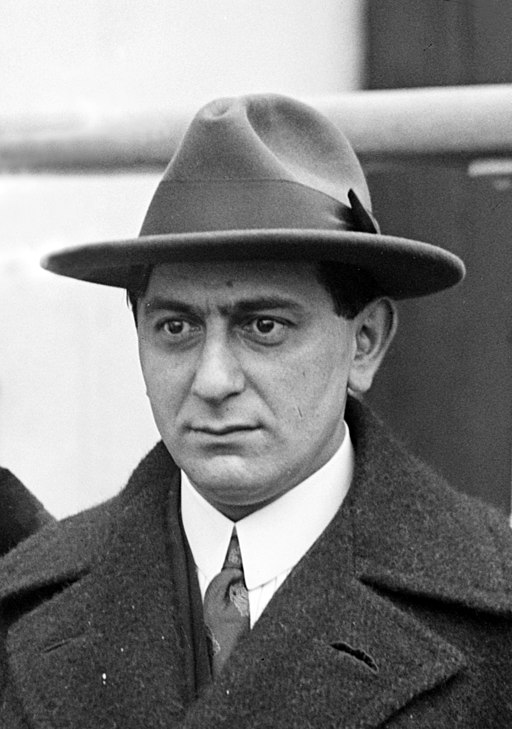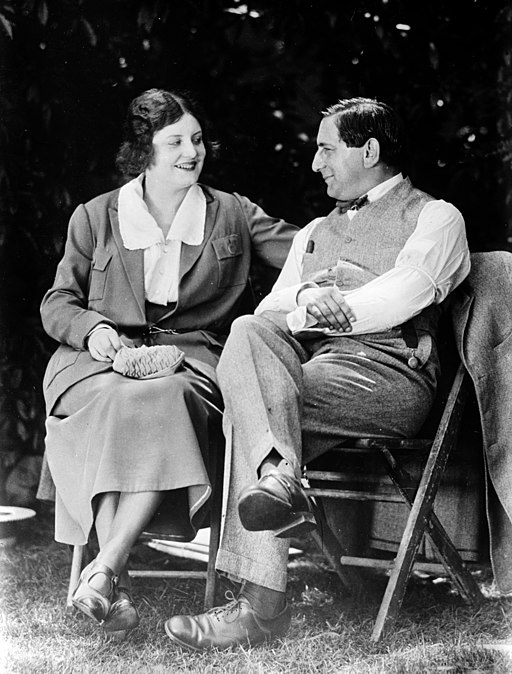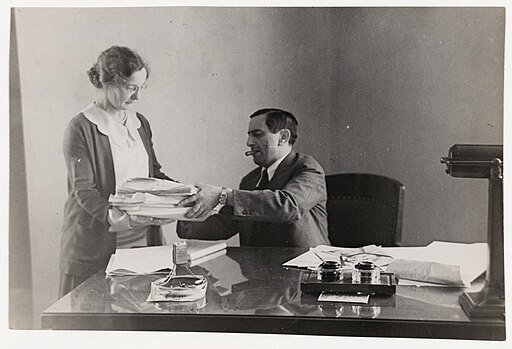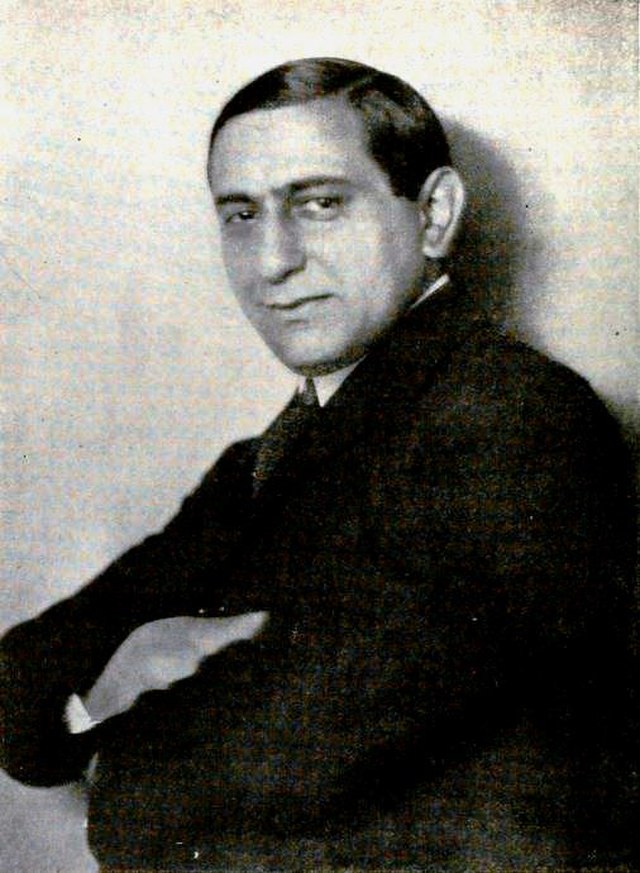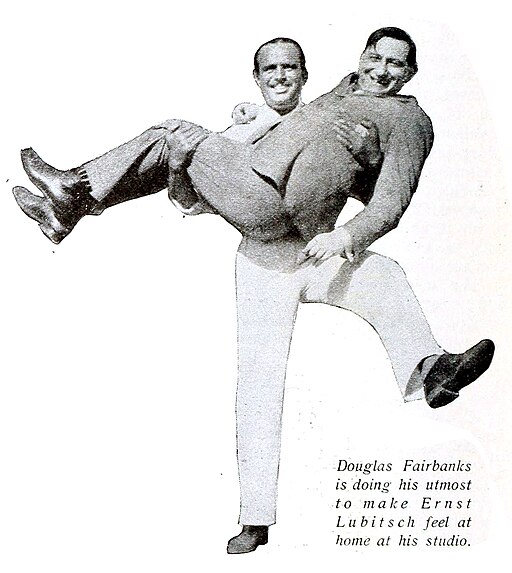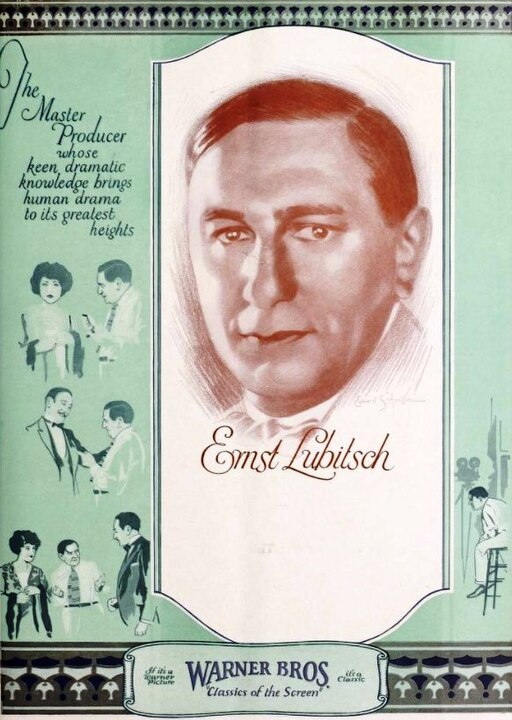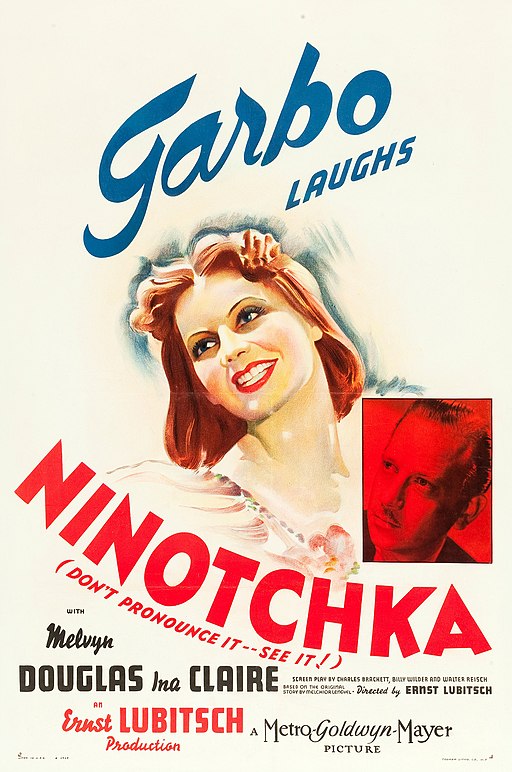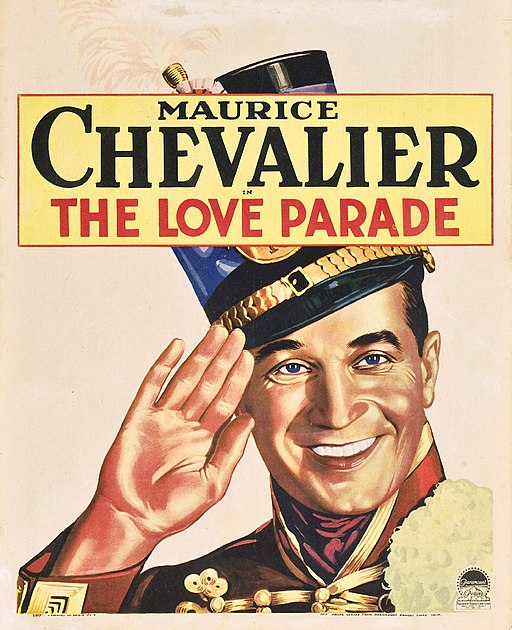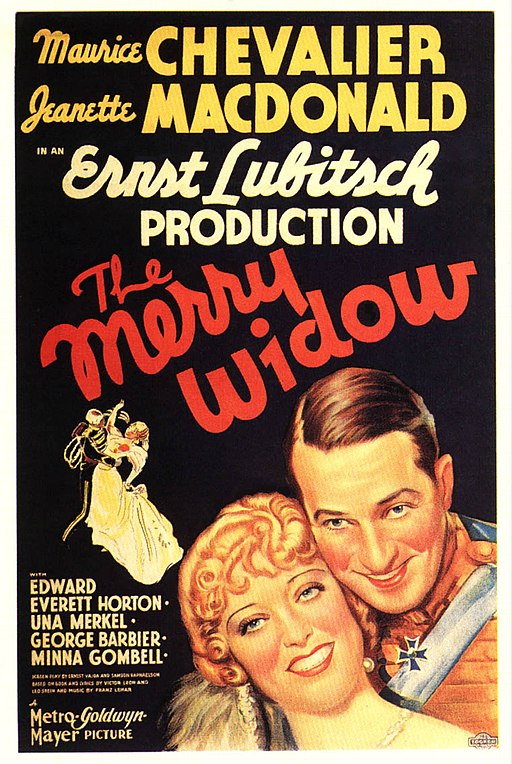Ernst Lubitsch
back| Full Name | Ernst Lubitsch |
| Born | January 28, 1892 |
| Birthplace | Berlin, Germany |
| Died | November 30, 1947 |
| Buried | Forest Lawn Memorial Park, Glendale, California, USA |
| Married to | Helene Kraus (1918 - 1921), Vivian Gaye (1922 - his death) |
| Children | Nicola Lubitsch (daughter with Vivian Gaye) |
| Notable films | The Love Parade (1929) - Ninotchka (1939) - To Be or Not to Be (1942) - The Shop Around the Corner (1942) - Heaven Can Wait (1943) |
Ernst Lubitsch
The Man that changed Cinema with his “Lubitsch Touch”
Ernst Lubitsch, born January 28, 1892, in Berlin, Germany, was a pioneering film director famed for his unique style, the "Lubitsch Touch," characterized by subtle humor and sophisticated storytelling.
Starting his career in silent films, Lubitsch quickly gained notoriety for his keen sense of satire and romantic comedy. He moved to Hollywood in the 1920s, where he transitioned effortlessly into sound films, influencing the musical and romantic comedy genres. His notable works include "Ninotchka," "To Be or Not to Be," and "The Shop Around the Corner."
Related
Ernst Lubitsch
Biography and Analysis of his Career as Movie Director
Ernst Lubitsch was born on January 28, 1892, in Berlin, Germany, to a family of Russian Jewish descent. He began his career in the film industry as an actor and then quickly transitioned to directing. His early work in Germany included both silent films and early sound films. Lubitsch's style was marked by a subtle and sophisticated form of comedy, which was highly influential in the film industry.
In 1922, Lubitsch moved to Hollywood, where he made a significant impact on the American film industry. He became known for his "Lubitsch Touch," a term that implies a subtle and sophisticated approach to filmmaking, especially in the realms of comedy and romance. His ability to infuse films with a unique blend of wit, satire, and elegance set him apart from his contemporaries.
Lubitsch's influence extended beyond his individual films. He played a key role in the development of the musical and romantic comedy genres in Hollywood. His approach to dialogue, character development, and narrative structure had a lasting impact on the film industry.
Ernst Lubitsch passed away on November 30, 1947, in Hollywood, California, leaving behind a legacy as one of the most influential directors in the history of cinema. His films continue to be celebrated for their style, humor, and insight into human nature.
Video about the Lubitsch Touch
Analysis of Direction Style of Ernst Lubitsch:
Ernst Lubitsch, renowned for his distinctive filmmaking style, is often celebrated for what came to be known as the "Lubitsch Touch." This term, coined by critics and fellow filmmakers, refers to a unique blend of subtlety, sophistication, and wit that characterized his work. Here's an analysis of key elements of Lubitsch's directorial style:
Subtlety and Suggestion:
- Implied Meaning: Lubitsch was a master of subtlety. He often suggested more than he showed, allowing the audience's imagination to fill in the gaps. This was especially evident in his handling of risqué subjects, which he approached with innuendo and implication rather than explicitness.
- Visual Wit: He employed clever visual storytelling techniques, often using objects or actions to imply off-screen events. This method was not only innovative for its time but also added a layer of sophistication to his storytelling.
Sophisticated Humor:
- Wit Over Slapstick: While many of his contemporaries relied on slapstick, Lubitsch's humor was more cerebral. He favored witty dialogue, sophisticated scenarios, and a playful approach to serious themes.
- Elegance and Charm: His comedies were marked by a refined, urbane sense of humor. Even when dealing with potentially controversial subjects, his films maintained an air of elegance and charm.
Mastery of Film Language:
- Visual Storytelling: Lubitsch was known for his exceptional ability to tell a story visually. His use of framing, composition, and editing was innovative and contributed significantly to the narrative without needing excessive dialogue.
- Symbolic Use of Objects: He often used objects symbolically to convey deeper meanings or emotions, a technique that added depth and richness to his films.
Handling of Romance and Relationships:
- Complex Characters: His films often featured complex, multi-dimensional characters. He had a knack for exploring the intricacies of human relationships and the nuances of romantic entanglements.
- Mature Treatment of Love: Lubitsch's films presented a mature, often bittersweet perspective on love and relationships, avoiding clichés and easy resolutions.
Innovation and Adaptability:
- Transition to Sound: Lubitsch smoothly transitioned from silent to sound films, embracing the new technology to enhance his storytelling. He was one of the first directors to effectively use sound not just as a novelty but as an integral part of the narrative.
- Musical Genre: He played a pivotal role in the development of the musical film genre in Hollywood, using songs and music as extensions of the story.
Influence and Legacy:
- Lubitsch Touch: The "Lubitsch Touch" has influenced generations of filmmakers. His ability to balance humor with depth, sophistication with accessibility, and visual storytelling with dialogue, set a high standard for filmmakers.
- Genre Versatility: While best known for his comedies, Lubitsch also made significant contributions to other genres, including historical dramas and musicals, demonstrating his versatility as a director.
Ernst Lubitsch's style was marked by a rare combination of artistic elegance, narrative innovation, and a deep understanding of human emotions and relationships. His films not only entertained but also offered insightful commentary on society and human behavior, making him one of the most respected and influential directors in the history of cinema.
Awards and Nominations:
Academy Awards (Oscars)
- Nominated for Best Director: Ernst Lubitsch received three Oscar nominations for Best Director during his career.
- 1930: For "The Love Parade."
- 1932: For "The Smiling Lieutenant."
- 1944: For "Heaven Can Wait."
Honorary Awards
- Honorary Oscar: In 1947, the year he died, Lubitsch was awarded an Honorary Oscar. This award was in recognition of his distinguished contributions to the art of the motion picture.
Other Recognitions
- Posthumous Recognition: While specific awards were limited, Lubitsch's work has been celebrated extensively posthumously. His films have been the subject of retrospectives and have been recognized for their significant impact on the film industry.
- Influence on Filmmakers: Perhaps more telling than formal awards is the influence Lubitsch had on future generations of filmmakers. Directors like Billy Wilder, Alfred Hitchcock, and Stanley Kubrick have cited Lubitsch's work as a major influence on their own careers.
Legacy and Impact
- Cinematic Innovations: Lubitsch's contributions to cinema, particularly in the realms of comedy and the musical, have been widely recognized by film historians and critics.
- Cultural Impact: His films are often studied for their cultural significance, narrative techniques, and unique style, contributing to his enduring legacy in the world of cinema.
While the lack of numerous awards might suggest otherwise, Ernst Lubitsch's true accolade lies in his enduring influence on the language and art of filmmaking. His innovative techniques, storytelling prowess, and the famed "Lubitsch Touch" have cemented his place as one of the most significant directors in the history of cinema.
Significance of his movie “The Love Parade” for his career:
"The Love Parade" (1929) holds a significant place in Ernst Lubitsch's career for several reasons, marking a pivotal point in both his filmography and the broader context of cinema:
Transition to Sound Films
Sound Film Debut: "The Love Parade" was Lubitsch's first sound film, coming at a time when the film industry was transitioning from silent to talking pictures. His successful adaptation to this new technology showcased his versatility and foresight as a director.
Innovation in Musical Genre
Musical Pioneering: The film is one of the earliest examples of the movie musical genre in Hollywood. Lubitsch innovatively integrated songs and music into the narrative, setting a standard for future musicals.
Artistic and Technical Mastery
Directional Brilliance: Lubitsch's direction in "The Love Parade" demonstrated his ability to blend dialogue, visual storytelling, and music, a skill that many of his contemporaries struggled with during the early sound era.
Critical and Commercial Success
Acclaim and Influence: The film was both a critical and commercial success. It received several Academy Award nominations, including Best Picture and Best Director, solidifying Lubitsch's reputation in Hollywood.
Establishing Lubitsch's Style
The Lubitsch Touch: "The Love Parade" exemplified the "Lubitsch Touch" – a blend of sophistication, wit, and elegance. This film helped to define his style and set the tone for his later works.
Career Impact
Establishing a Niche: This film established Lubitsch as a master of the musical and sophisticated comedy, paving the way for his subsequent successes in these genres.
In summary, "The Love Parade" was crucial in transitioning Ernst Lubitsch into the sound era, showcasing his adaptability and creative vision. It played a significant role in defining his career and left a lasting impact on the musical genre in cinema.
Memorable Quotes from Ernst Lubitsch:
On Subtlety and Implication:
- "Let the audience add up two plus two. They'll love you forever."
- This quote reflects Lubitsch's belief in the intelligence of the audience and his mastery of suggestion and subtlety in storytelling.
On the Essence of Film:
- "In Hollywood, directors are like traffic cops."
- Lubitsch's humorous take on the role of a director in the filmmaking process, especially in the Hollywood system.
Regarding Comedy:
- "There are a thousand ways to point a camera, but really only one."
- Emphasizing his belief in finding the unique and correct perspective for each scene or shot.
On Filmmaking:
- "I've been to Paris, France and I've been to Paris, Paramount. I think I prefer Paris, Paramount."
- A witty remark about the Hollywood way of creating movie magic, contrasting it with the real world.
Regarding His Style:
- "I've been called a lot of things, but never an auteur."
- Reflecting on the various ways he has been described and categorized in the film industry.
On the Art of Cinema:
- "I make pictures about things I like."
- Simple yet profound, indicating his personal connection to the stories he chose to tell.
Regarding His Legacy:
- "My movies are not movies; they are films."
- Lubitsch differentiating between what he considered to be the more transient nature of 'movies' versus the lasting art form of 'films'.
On Life and Humor:
- "A good cigar is as great a comfort to a man as a good cry to a woman."
- A humorous and somewhat stereotypical observation of gender and coping mechanisms, indicative of his era.
Movies Directed by Ernst Lubitsch:
Silent Era
1914: "Fräulein Seifenschaum" - Information about this film is scarce, as it is one of Lubitsch's earliest works in the silent era.
1915: "Sugar Daddies" - A short comedy, part of Lubitsch's early work in the German film industry.
1916: "Schuhpalast Pinkus" (Shoe Palace Pinkus) - A comedy about Sally Pinkus, a shoemaker's apprentice who climbs the social ladder.
1917: "Wenn vier dasselbe tun" - A film that showcases Lubitsch's early exploration of romantic and comedic themes.
1918: "Ich möchte kein Mann sein" (I Don't Want to Be a Man) - A gender-bending comedy about a young woman who dresses as a man.
1918: "Die Augen der Mumie Ma" (The Eyes of the Mummy) - A drama involving an artist and an Egyptian woman haunted by a menacing figure.
1919: "Die Puppe" (The Doll) - A whimsical comedy about a man who marries a life-sized doll to inherit his family fortune.
1919: "Mein Mann, der seine Frau sucht" - Another early work, with limited information available.
1919: "Rausch" (Intoxication) - A drama centered around psychological and romantic themes.
1920: "Kohlhiesels Töchter" - A comedy revolving around the courtship of two sisters.
1920: "Sumurun" - A drama with an ensemble cast, set in a Middle Eastern milieu.
1921: "Anna Boleyn" - A historical drama about the tragic Queen Anne Boleyn.
1922: "Die Bergkatze" (The Wildcat) - A romantic comedy set in a military fortress, known for its stylistic experimentation.
1923: "Rosita" - A romantic drama, one of Lubitsch's first American films, starring Mary Pickford.
Transition to Sound
1924: "The Marriage Circle" - A sophisticated comedy that explores marital infidelity and misunderstandings.
1925: "Lady Windermere's Fan" - An adaptation of Oscar Wilde's play, praised for its wit and elegance.
1925: "Three Women" - A drama about the romantic entanglements of three women with the same man.
1926: "So This Is Paris" - A light-hearted comedy about the romantic adventures of two married couples.
1927: "The Student Prince in Old Heidelberg" - A romantic drama about a prince and his love for a barmaid.
1928: "The Patriot" - A historical drama centered around the last days of Emperor Paul I of Russia.
Sound Films
1929: "Eternal Love" - A romantic drama, Lubitsch's last silent film.
1929: "The Love Parade" - A pioneering musical comedy about a royal love affair.
1930: "Monte Carlo" - A romantic musical comedy set in the glamorous Monte Carlo.
1931: "The Smiling Lieutenant" - A musical romantic comedy about a love triangle involving a lieutenant.
1932: "Broken Lullaby" (The Man I Killed) - A dramatic departure from his usual genre, focusing on the aftermath of World War I.
1932: "One Hour with You" - A musical comedy about marital infidelity.
1932: "Trouble in Paradise" - A romantic comedy about two thieves in love.
1933: "Design for Living" - A romantic comedy-drama about a love triangle between two men and a woman.
1934: "The Merry Widow" - A musical adaptation of the operetta, focusing on a romantic entanglement in a fictional kingdom.
1937: "Angel" - A romantic drama about a neglected wife's affair.
1938: "Bluebeard's Eighth Wife" - A comedy about a millionaire who marries a Frenchwoman.
1939: "Ninotchka" - A romantic comedy-drama starring Greta Garbo, about a stern Russian woman who falls in love in Paris.
1940: "The Shop Around the Corner" - A romantic comedy about two employees at a leather goods shop in Budapest.
1941: "That Uncertain Feeling" - A comedy about a married woman who is attracted to a pianist.
1942: "To Be or Not to Be" - A dark comedy set in Nazi-occupied Poland, revolving around a troupe of actors.
1943: "Heaven Can Wait" - A romantic fantasy about a man who recounts his past loves in the afterlife.
1946: "Cluny Brown" - A comedy about a young woman who defies social norms.
1948: "That Lady in Ermine" (Completed by Otto Preminger) - A musical comedy set in Italy, one of Lubitsch's final films.

